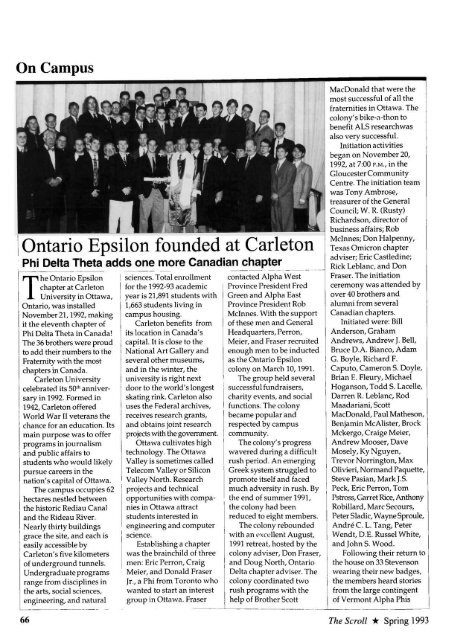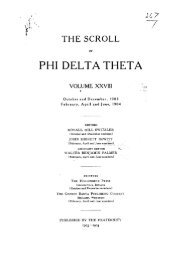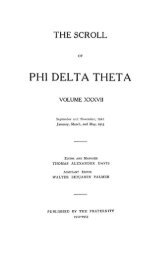1993 Volume 116 No 1–4 - Phi Delta Theta Scroll Archive
1993 Volume 116 No 1–4 - Phi Delta Theta Scroll Archive
1993 Volume 116 No 1–4 - Phi Delta Theta Scroll Archive
You also want an ePaper? Increase the reach of your titles
YUMPU automatically turns print PDFs into web optimized ePapers that Google loves.
On Campus<br />
Ontario Epsilon founded at Carleton<br />
<strong>Phi</strong> <strong>Delta</strong> <strong>Theta</strong> adds one more Canadian chapter<br />
The Ontario Epsilon<br />
chapter at Carleton<br />
University in Ottawa,<br />
Ontario, was installed<br />
<strong>No</strong>vember 21,1992, making<br />
it the eleventh chapter of<br />
<strong>Phi</strong> <strong>Delta</strong> <strong>Theta</strong> in Canada!<br />
The 36 brothers were proud<br />
to add their numbers to the<br />
Fraternity with the most<br />
chapters in Canada.<br />
Carleton University<br />
celebrated its 50* anniversary<br />
in 1992. Formed in<br />
1942, Carleton offered<br />
World War II veterans the<br />
chance for an education. Its<br />
main purpose was to offer<br />
programs in journalism<br />
and public affairs to<br />
students who would likely<br />
pursue careers in the<br />
nation's capital of Ottawa.<br />
The campus occupies 62<br />
hectares nestled between<br />
the historic Rediau Canal<br />
and the Rideau River.<br />
Nearly thirty buildings<br />
grace the site, and each is<br />
easUy accessible by<br />
Carleton's five kilometers<br />
of underground tunnels.<br />
Undergraduate programs<br />
range from disciplines in<br />
the arts, social sciences,<br />
engineering, and natural<br />
sciences. Total enrollment<br />
for the 1992-93 academic<br />
year is 21,891 students with<br />
1,663 students living in<br />
campus housing.<br />
Carleton benefits from<br />
its location in Canada's<br />
capital. It is close to the<br />
National Art Gallery and<br />
several other museums,<br />
and in the winter, the<br />
university is right next<br />
door to the world's longest<br />
skating rink. Carleton also<br />
uses the Federal archives,<br />
receives research grants,<br />
and obtains joint research<br />
projects with the government.<br />
Ottawa cultivates high<br />
technology. The Ottawa<br />
Valley is sometimes called<br />
Telecom Valley or Silicon<br />
Valley <strong>No</strong>rth. Research<br />
projects and technical<br />
opportunities with companies<br />
in Ottawa attract<br />
students interested in<br />
engineering and computer<br />
science.<br />
Establishing a chapter<br />
was the brainchild of three<br />
men: Eric Perron, Craig<br />
Meier, and Donald Fraser<br />
Jr., a <strong>Phi</strong> from Toronto who<br />
wanted to start an interest<br />
group in Ottawa. Fraser<br />
contacted Alpha West<br />
Province President Fred<br />
Green and Alpha East<br />
Province President Rob<br />
Mcinnes. With the support<br />
of these men and General<br />
Headquarters, Perron,<br />
Meier, and Fraser recruited<br />
enough men to be inducted<br />
as the Ontario Epsilon<br />
colony on March 10,1991.<br />
The group held several<br />
successful fundraisers,<br />
charity events, and social<br />
functions. The colony<br />
became popular and<br />
respected by campus<br />
community.<br />
The colony's progress<br />
wavered during a difficult<br />
rush period. An emerging<br />
Greek system struggled to<br />
promote itself and faced<br />
much adversity in rush. By<br />
the end of summer 1991,<br />
the colony had been<br />
reduced to eight members.<br />
The colony rebounded<br />
with an excellent August,<br />
1991 retreat, hosted by the<br />
colony adviser, Don Fraser,<br />
and Doug <strong>No</strong>rth, Ontario<br />
<strong>Delta</strong> chapter adviser. The<br />
colony coordinated two<br />
rush programs with the<br />
help of Brother Scott<br />
MacDonald that were the<br />
most successful of all the<br />
fraternities in Ottawa. The<br />
colony's bike-a-thon to<br />
benefit ALS researchwas<br />
also very successful.<br />
Initiation activities<br />
began on <strong>No</strong>vember 20,<br />
1992, at 7:00 P.M., in the<br />
Gloucester Community<br />
Centre. The initiation team<br />
was Tony Ambrose,<br />
treasurer of the General<br />
Council; W. R. (Rusty)<br />
Richardson, director of<br />
business affairs; Rob<br />
Mcinnes; Don Halpenny,<br />
Texas Omicron chapter<br />
adviser; Eric Castiedine;<br />
Rick Leblanc, and Don<br />
Fraser. The initiation<br />
ceremony was attended by<br />
over 40 brothers and<br />
alumni from several<br />
Canadian chapters.<br />
Initiated were: Bill<br />
Anderson, Graham<br />
Andrews, Andrew J. Bell,<br />
Bruce D.A. Bianco, Adam<br />
G. Boyle, Richard F.<br />
Caputo, Cameron S. Doyle,<br />
Brian E. Fleury, Michael<br />
Hoganson, Todd S. Lacelle,<br />
Darren R. Leblanc, Rod<br />
Maadariani, Scott<br />
MacDonald, Paul Matheson,<br />
Benjamin McAlister, Brock<br />
Mckergo, Craige Meier,<br />
Andrew Mooser, Dave<br />
Mosely, Ky Nguyen,<br />
Trevor <strong>No</strong>rrington, Max<br />
Olivieri, <strong>No</strong>rmand Paquette,<br />
Steve Pasian, Mark J.S.<br />
Peck, Eric Perron, Tom<br />
Pstross, Garret Rice, AnUiony<br />
Robillard, Marc Secours,<br />
Peter Sladic, Wayne Sproule,<br />
Andre C. L. Tang, Peter<br />
Wendt, D.E. Russel White,<br />
and John S. Wood.<br />
Following their return to<br />
the house on 33 Stevenson<br />
wearing their new badges,<br />
the members heard stories<br />
from the large contingent<br />
of Vermont Alpha <strong>Phi</strong>s<br />
66 TheScroU • Spring <strong>1993</strong>

















